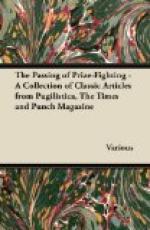Simple SIMON? Well, that’s
not as clear as it looks.
The typical noodles of nursery books
Were podgy and chubby, or lanky and pale,
And—they tried to drop salt
on poor dicky-bird’s tail!
A fat boy in tight breeks with a palpable
bait
May look a great fool; but I guess we
must wait,—
Before we bemock him as crass and absurd,—
To see—what effect it will
have on the Bird!
The trial’s well timed, and the
bait looks “not bad;”
The Boy may “know his book,”
though he’s only a lad.
Birds sometimes fall victims to Boys on
the prowl,
And the Voter Bird is not the wariest
fowl.
The Voter Bird shortly must show what
he’s worth
He may be the stupidest dicky on earth,
Predestinate victim to salt-pinch or net;
But then he may not,—and
he is “not caught yet!”
* * * * *
AN AUTOCRAT’S ASPIRATION.—Pan-Slavism for Holy Russia, and Pan-Slav(e)ism for the rest of Europe.
* * * * *
LAND AND BRAIN.
(A PAGE FROM A VADE MECUM FOR POLITICAL ECONOMISTS.)
Question. Can
you tell me how long an Author has a right to the
profits arising out of his literary labours?
Answer. Forty-two
years, or the term of his natural life plus
seven years further, whichever may be
the longer.
Q. And should Lord
MONKSWELL’s Copyright Bill, which has
been read a First Time in the House of
Peers, become law, will not
this right be extended to thirty years
after the death of the Author?
A. It will, to his
great advantage. The same measure contains
other valuable provisions to secure to
the Author the just profit of
his brain-work.
Q. But will not these
advantages be purchased at the price of a
loss to the general good?
A. Very likely—the
community will suffer for the benefit of the
individual.
Q. In like manner a
Patentee, who invents a most useful article,
enjoys (for a consideration) a monopoly
of its sale, does he not?
A. For fourteen years.
This enables him to recoup himself for
the thought and labour he has employed
in the most useful article’s
construction.
Q. If Author and Inventor
were allowed an absolute monopoly of
the profits arising out of their brain-work,
it would be immoral?
A. No doubt, as the
individuals would benefit at the cost of the
community.
Q. Why should a butterman,
then, have an absolute right in the
sale of his butter?
A. Because butter is
butter, and brains are merely brains.
Q. And would it not
be for the benefit of the community if the
landowner of a freehold were deprived
of his rights after a term of
years, and his holding be given to the
public?
A. Oh dear, no!
Land, as RUDYARD KIPLING would say, “is
quite another story!”




